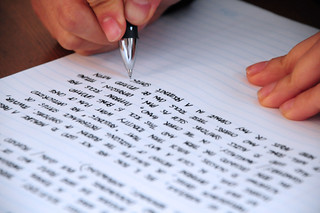The second guest post in the Writers' Lab is by Mohamed Saeed from South Africa. He shares with us his personal story on how he found in writing a way to share his views, experiences and thoughts with the world.
Mohamed Saeed (aka Abd’ ullah) is a graduate from the University of KWAZUL- NATAL (UKZN). He holds a certificate of Merit in Social Equity in Professional Practice, a National Professional Diploma in Education (NPDE) and an Advance Certificate in Education (ACE) specialising in teaching for Social Justice.
Probing the media headlines and creating waves, fighting against oppression and injustices, alleviating poverty and ignorance and promoting fundamental rights and values is his passion and mission in life. He shuns destructive thinking, violence and negative competition. He enjoys reading, re-searching and doing volunteer work for humanitarian NGOs.
I grew up during the Apartheid era in South Africa, and the education system at that time clearly reflected the government’s discriminatory and racial way of life –segregation based on colour, race and class.
Schools were required to indoctrinate, teach and promote the apartheid ideals and white supremacy; our history text books, discipline methods, rules, regulations and teaching methods were especially designed to foster Apartheid.
Being classified as an Asian, I could not go to the local library, so my primary school teacher asked me and other students to read a daily newspaper to improve our English. As I am a second-generation South African and grew up in a household where the main language was not English, Newspapers went a long way towards the improvement of my English.
As a Muslim the Quran and Sunnah (practices of Prophet Muhamed, PBUH) are my guides. They determine my outlook on life, justice, tyranny, oppression, truth and falsehood. It is therefore incumbent upon me not to remain silent or inactive when needs be.
I find in most newspapers and books Islam is equated with terrorism, oppression, women abuse, violence, intolerance, and backwardness. I am truly concerned by this mindset about themisrepresentation of Islam and Muslims in the print and mass media. This inspires and stimulates me to do research and write articles and letters to the editor in order to create awareness.
Whether we like to admit it or not, the different types of media directly affects our lives, influences our opinions and penetrates our subconscious. Over the years our homes, teachers at school, our different religions and institutions, culture, the society that we live in, the mass media that we are exposed too subliminally colonise our vulnerable minds. This socialization generally becomes our way of life and viewpoint and therefore sometimes we don’t want to accept, dialogue, debate or hear the other voice.
Through writing we can express our complaints, lobby for a cause, present a viewpoint, negate myths and serve as an antidote to the less than objective and/or balanced media coverage of events. The more I read the more questions I have and over the years I have realised that some of the mass media are presenting half-truths and distortions.
Although it’s not always hate that causes individuals, writers and authors to make foolish allegations and disingenuous statements against Islam, ignorance generally plays a major part in these dishonest expression or stereotypical assumptions and perceptions, and I believe as Muslims we have much to blame as we are not effectively engaging with the broader global community.
Similarly, most western writers have a very depressing and unconstructive narrative and storyline about my continent- Africa. It is always about diseases, famine, human rights’ abuses, rape, murder, crime and malnourished children. Agreed, Africa is a continent of tribal wars, huge inequalities and corruption but it is also a land of natural resources and beauty, magnificent oceans, mountains, rivers and wildlife, World heritage sites, an emerging business community and blessed by relatively lower rate of natural disasters.
A recent guest to my country, South Africa, commented: “I was commended by a friend for my “courage” for touring South Africa. For him, South Africa is where wild animals and “primitive” people prey on innocent tourists”. Where did this stereotype come from?
We can only challenge the deceptions, misinformation and negative discourse about us through effective communication and constructive dialogue. And writing offers the perfect platform to articulate views and explain a multifaceted or difficult point or situation to readers with clarity. It allows for a two way dialogue.
Writing allows me to critically read and think, to re-learn, re-skill and decolonise my mind. Writing allows me to tell my untold stories to a larger audience. Writing allows me to express my emotions and inner most feelings and be a voice of reason, voice for the voiceless and be a change agent. Writing allows me to have hope that brainwashed individuals might have their minds opened to reason and be transformed.
The wise words of Gloria Anzaldua inspires me to keep on write: “ Why am I compelled to write? Because the world I create in the writing compensates for what the real world does not give me. By writing I put order in the world, give it a handle so I can grasp it. I write because life does not appease my appetites and anger. To become more intimate with myself and you. To discover myself, to preserve myself, to make myself, to achieve self-autonomy. To dispel the myths that I am a mad prophet or a poor suffering soul. To convince myself that I am worthy and that what I have to say is not a pile of shit. Finally, I write because I’m scared of writing, but I’m more scared of not writing”.




















